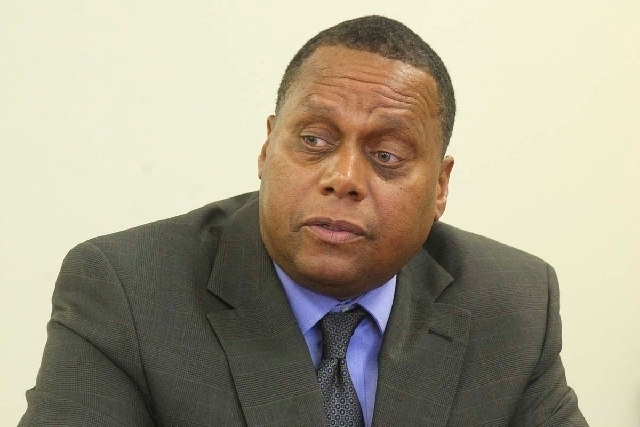Southern Nevada housing authority director has to go

Lame answers from bureaucrats are nothing new, but John Hill, executive director of the Southern Nevada Regional Housing Authority, provided some of the lamest to Review-Journal reporter Yesenia Amaro.
Her most recent stories about the authority are proof positive Hill concealed important information from his board of directors. He only told them what he wanted them to know. That’s dishonest.
Hill’s supporters and protectors on the board, especially the Rev. Dave Casaleggio, should be mortified. And the elected officials from Las Vegas, Clark County, Henderson and North Las Vegas who appointed Hill’s protectors should be paying attention as well. If not, then shame on them, too.
The directors should be horrified and Hill should be fired for cause. Plenty of his predecessors were.
Apparently, he’s just another in a series of poor managers hired to take care of low-income government housing in Southern Nevada. The Las Vegas Housing Authority had been plagued by mismanagement scandals since the mid-1980s. Executive directors Arthur Sartini, Carl Rowe, Frederick Brown and Parviz Ghardiri all left under clouds.
In 2010, the local agencies in Southern Nevada were all consolidated into the Southern Nevada Regional Housing Authority and Hill was hired. Things were supposed to get better.
Amaro’s dogged reporting showed Hill didn’t tell the 13 board members that the authority was fined $47,000 by the state’s Occupational Safety and Health Administration for six violations on Aug. 10. The violations, including one deemed “willful-serious,” stemmed from the repairs of a water line at Biegger Estates in April.
Hill told Amaro Friday he didn’t tell the authority’s board about the citations. When asked why he didn’t tell them, his pitiful reply was: “It was just something that didn’t happen.”
When asked why he didn’t submit a plan for corrective action and pay the fines by a Sept. 1 deadline, he told Amaro: “I’m not exactly sure what the delay was.”
But wait. There’s more.
The authority is not paying all its bills. It’s letting some slide.
The authority had to be threatened by the manager of the Clark County automotive division before it paid off $27,323 six months after it was due. Then $17,452 went unpaid to the county’s fleet services. The authority paid about $10,000 of that debt on Aug. 26.
The security company for the authority was due about $70,000 in past bills and threatened to cut off service in February before that was paid. Dana’s Mechanical LLC, Senior Cleaning and TGI Painting all had trouble with bills that went unpaid by the housing authority.
Last year, the Las Vegas Valley Water District, Republic Services and two other companies stop extending credit to the authority.
The board members were told about the unpaid bills but thought that problem was being resolved. It wasn’t.
Hill’s explanation was that the authority wasn’t receiving all the bills.
That didn’t explain why when other government agencies called about overdue bills, they were not paid promptly.
At the same time bills went unpaid, Hill and the authority’s outside attorney, Theodore Parker, asked for, and received, more money, over the vehement objections of the Service Employees International Union.
SEIU employees had been put on two-days-a-month furloughs, a 9 percent pay decrease to help balance the roughly $150 million a year budget.
In April 2014, Parker, Nelson & Associates asked for a fee increase of $329,205, bringing its legal fees to about $907,000 for the fiscal year ending Oct. 1, 2014. (Bet his firm was paid on time.)
Parker said he needed the money because of work beyond what was normally done, including negotiating contracts with SEIU.
In August 2014, in a split vote, the board gave Hill a raise of 2.5 percent, plus a bonus of 2.5 percent.
His 2013 base salary was $135,306, and his overall annual compensation, which included extra payments and benefits, totaled $216,252, according to Transparent Nevada.
His base salary increased by $3,382, and his bonus was the same. His evaluation at that time was that he “met expectations,” not a wildly positive review. Eight of Hill’s supporters on the board approved of the raise. Opponents questioned why he wasn’t asking for a salary decrease when the budget was so tight that a deficit of more than $1 million was expected.
So, at the same time bills weren’t being paid and union employees’ salaries were cut nearly 10 percent through furloughs, Hill nabbed a raise and Parker was expected to be paid nearly $1 million over a year in legal fees.
Two female managers have complained of gender discrimination by Hill, but that has not been resolved. On his watch, two audits by the U.S. Department of Housing and Urban Development found issues of concern.
The number of his supporters on the board surely has dwindled now that the board has learned about the fines Hill concealed and the billing problems he is slow fixing.
The song “Smooth Operator” keeps going through my mind.
Jane Ann Morrison’s column runs Thursdays. Leave messages for her at 702-383-0275 or email jmorrison@reviewjournal.com. Find her on Twitter: @janeannmorrison.